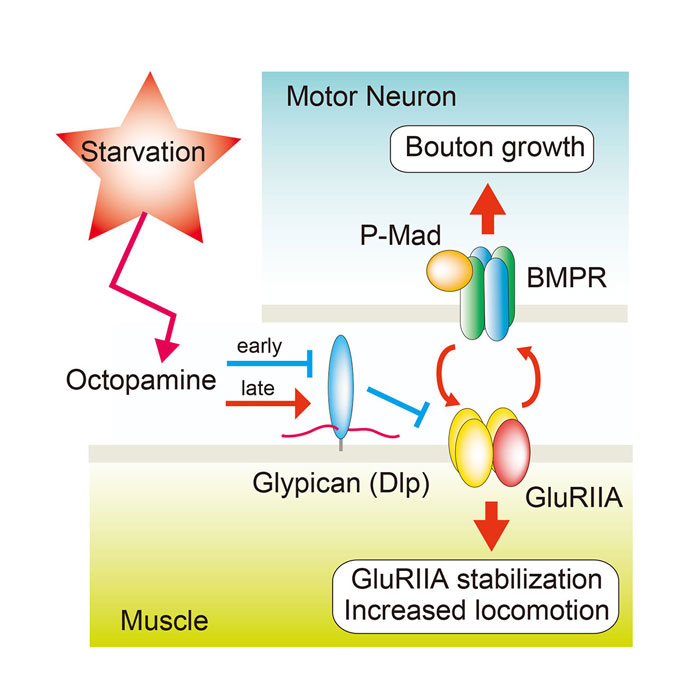
HOME > Topics2019 > 17 September 2019
17 September 2019
Keisuke Kamimura (Neural Network Project) published a paper entitled ”The HSPG Glypican Regulates Experience-Dependent Synaptic and Behavioral Plasticity by Modulating the Non-Canonical BMP Pathway” in Cell Reports
The HSPG Glypican Regulates Experience-Dependent Synaptic and Behavioral Plasticity by Modulating the Non-Canonical BMP Pathway
- <Title of the paper>
- The HSPG Glypican Regulates Experience-Dependent Synaptic and Behavioral Plasticity by Modulating the Non-Canonical BMP Pathway
- <Journal>
- Cell Reports
DOI:https://doi.org/10.1016/j.celrep.2019.08.032
https://www.cell.com/cell-reports/fulltext/S2211-1247(19)31072-1
Summary
In Drosophila, octopamine signaling increases larval locomotor speed and synaptic bouton numbers at neuromuscular junctions under food deprivation conditions. We found that a glypican (Dally-like), the expression of which is controlled by octopamine signaling, regulates this process by modulating the activity of GluRIIA-mediated non-canonical BMP pathway.
Details
Under food deprivation conditions, Drosophila larvae exhibit increases in locomotor speed and synaptic bouton numbers at neuromuscular junctions (NMJs). Octopamine, the invertebrate counterpart of noradrenaline, plays critical roles in this process; however, the underlying mechanisms remain unclear. We show here that a glypican (Dlp) negatively regulates type I synaptic bouton formation, postsynaptic expression of GluRIIA, and larval locomotor speed. Starvation-induced octopaminergic signaling decreases Dlp expression, leading to increases in synapse formation and locomotion. Dlp is expressed by postsynaptic muscle cells, and suppresses the non-canonical BMP pathway, which is composed of the presynaptic BMP receptor Wit and postsynaptic GluRIIA-containing ionotropic glutamate receptor. We find that during starvation, decreases in Dlp increase non-canonical BMP signaling leading to increases in GluRIIA expression, type I bouton number and locomotor speed. Our results demonstrate that octopamine controls starvation-induced neural plasticity by regulating Dlp, and provides insights into how proteoglycans can influence behavioral and synaptic plasticity.


